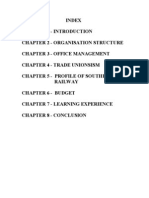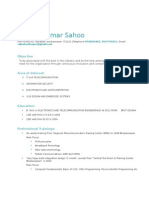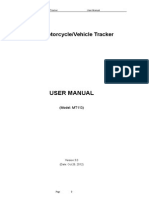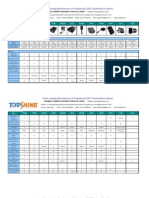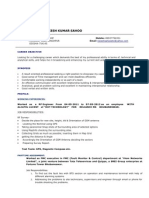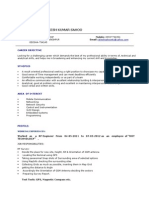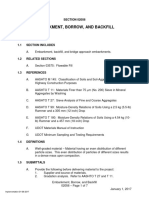RVNL
RVNL
Uploaded by
Rakesh SahooCopyright:
Available Formats
RVNL
RVNL
Uploaded by
Rakesh SahooCopyright
Available Formats
Share this document
Did you find this document useful?
Is this content inappropriate?
Copyright:
Available Formats
RVNL
RVNL
Uploaded by
Rakesh SahooCopyright:
Available Formats
About Rail Vikas Nigam Limited (RVNL)
Government of India has conceived a massive investment plan for rail sector to eliminate capacity bottlenecks on Golden Quadrilateral and Diagonals to provide strategic rail communication links to ports, construction of mega bridges for improving communication to the hinterland and development of multi-modal transport corridors. Rail Vikas Nigam Limited (RVNL), is a Special Purpose Vehicle created to undertake project development, mobilization of financial resources and implement projects pertaining to strengthening of Golden Quadrilateral and Port Connectivity. It is the first major non-budgetary initiative for creating rail transport capacity ahead of demand and on a commercial format. RVNL has been registered as a company under Companies Act 1956 on 24.1.2003. It is a wholly owned Government company under the provisions of Section 617 of Companies Act. Certificate of Incorporation was obtained on 24.1.2003. .
RVNL Mandate
RVNLs creation was approved by the Government of India on 19.12.2002 and it was registered as a Company under the Companies Act, 1956 on 24th January 2003. It is 100% Government owned Central Public Sector Undertaking. RVNL is created for the following purpose and mandate: i. ii. RVNL is a PSU, the equity of which may be given to other PSUs, Banks, Financial Institutions or other strategic partners. RVNLs role is that of a developer, who develops the project to enable non-budgetary funding, mobilizes financial resources and executes the project. The project is offered to railways for train operation and maintenance under the specific financial arrangement. In terms of legal status, RVNL is a Railway Administration under Railways Act, 1989. RVNL is an umbrella Special Purpose Vehicle (SPV), which undertakes project development, resource mobilization and can undertake the projects directly or by creation of Project Specific SPVs or any other financing structure, which is found suitable for a particular project. RVNL is to take up capacity augmentation projects on the golden quadrilateral and other bankable projects covered under National Rail Vikas Yojana. This programme included capacity augmentation projects on Golden Quadrilateral and its diagonals, last mile port connectivity and corridors to hinterland.
iii. iv.
v.
Operationalisation of RVNL began in Aug., 2003 with posting of three officers. The process for sanction of the posts for Board of Directors was commenced simultaneously and RVNL was fully operationalised in March, 2005 by placing the full complement of Board of Directors in position.
Role of RVNL
RVNL is assigned the following functions:
Arranging financial resources for the Projects. For this purpose, the RVNL would be authorized to approach the Financial Institutions, Banks, Domestic Market and the Bilateral and Multilateral Funding Agencies. Undertaking project development and execution of works. Creating Project specific SPVs for individual works, if required. Commercialization of projects wherever considered necessary and feasible. The concerned Zonal Railways will undertake the operation and maintenance of the Railway Projects on completion of their execution by the RVNL under a specific financial arrangement. For providing a revenue stream to RVNL, the projects may be done by RVNL on BOT concept, where Ministry of Railways is to pay Access Charge/User Charge.
Corporate Objectives
To undertake and execute successfully the project development pertaining to Strengthening of Golden Quadrilateral, Port and Hinterland connectivity and other viable Railway projects. To mobilize financial and human resources for project implementation. Timely execution of projects. To maintain a cost effective organizational set up. To encourage public private participation in rail related projects managed by RVNL. To be an infrastructure Project Management Company committed to sustainable development and environment friendly construction of rail related projects in the country. To acquire, purchase, license, concession or assign rail infrastructure assets including contractual rights and obligations
Organisation Chart of S & T Deptt. at CORE
R.L.Gupta CSTE | Alok Chaturvedi CSTE/P&D | Mudit Anand Dy.CSTE/Sig Dy.CSTE/Tele | Shyam Lal ESTE/Sig A.K.Verma ESTE/Store | A.K.Roy ASTE/Sig K.Venkateswarlu PS-I to CSTE K.C.Tripathi ASTE/HQ Pradeep Tiwari ASTE S.N.Joshi ESTE/Tele A.B.Saran Dy.CSTE/HQ Niraj Sinha CSTE/Project
Mr. Satish Agnihotri has taken over as Managing Director of Rail Vikas Nigam Limited on 27.01.2010. Mr. Satish Agnihotri, M.E. (Structures) and B.E. (Civil) from IIT, Roorkee, joined the Indian Railway Service of Engineers in 1984. Before joining as Managing Director of RVNL on 27.01.2010 he was working as Director (Projects) of the company since 4th July 2007. Before 4th July 2007, he headed the Metro Project Directorate of Ministry of Railways dealing with upcoming metro lines in metropolitan cities. While working as OSD to Member Engineering, he was involved in laying down the policies, standards, planning, implementation and monitoring of infrastructure projects all over Indian Railways. As Executive Director (Corporate Coordination) & OSD/Chairman Railway Board, he was engaged in substantive decision making in the Ministry of Railways. In his career, spanning over 24 years, he worked on important projects including construction of a double line bridge over river Ganga, doubling of tracks, major yard remodelings, etc. He worked on the Rajdhani Route of Allahabad Division, the most prestigious track on Indian Railways, as Maintenance Engineer progressively as Assistant Engineer, Divisional & Senior Divisional Engineer. He was largely responsible for raising the speed potential of Rajdhani route from 130 to 160/180 KMPH by upgrading the track geometry and strengthening of track. He was also deputed to Japan for undergoing training in Tunnel and Tunneling organized by Japan International Corporation Agency (JICA). Through UNDP, he was deputed to Germany, France and Austria for extensive training on maintenance of high speed track and upkeep of track machines. While working as Executive Director/Track Machine, he visited Germany, France, Italy and Russia as the team leader for development of high output track machines. Along with Chairman, Railway Board, he attended the Conference of Chief Executives of world railways in Japan, organized by UIC. Mr. Agnihotri has also keen interest in sports and was adjudged as best in sport and studies amongst all branches of Engineering at IIT, Roorkee and was awarded Sarojini Naidu Cup for Work and Play Smt Gita Mishra, an officer of 1982 batch of Indian Railway Personnel Service has taken over as
Director (Personnel) of Rail Vikas Nigam Limited on 13th October, 2008. She is a graduate from Lady Shri Ram College, Delhi University and also holds an Advance Diploma in Russian Language from Delhi University. She has held various responsible positions in Indian Railways including in-charge of Personnel and Establishment Department of Moradabad and Lucknow Division, Northern Railway, in-charge of Electronic Data and Processing Centre, Lucknow Division/ Northern Railway, Dy Director Senior, Lal Bahadur Shastri National Academy of Administration, Department of Personnel & Training, Mussoorie, Uttarakhand, Chief Personnel Officer/ Administration , South Eastern Railway, Kolkata, West Bengal. She has got the expertise of handling issues relating to human resources of the largest organization in India. Before joining Rail Vikas Nigam Limited as Director (Personnel), she was working as Executive Director Establishment (Non Gazetted)/ Railway Board, Ministry of Railways, New Delhi where she was associated with policy making on personnel maters. Smt. Mishra has participated in various national and international trainings and seminars on Personnel Management, Quality Management and Safety in Rail operations in India, London, Senegal, Canada etc. Mr. Mukul Jain Director/Operations Mr. Mukul Jain has taken over as Director (Operations) of Rail Vikas Nigam Limited on 16th June, 2010. He is a B.Tech in Mechanical Engineering from I.I.T. Delhi, and a Master of Engineering in Logistics & Supply Chain Management from Massachusetts Institute of Technology, Boston and Zaragoza Logistics Center, Spain. Mr Jain was the Executive Director in Container Corporation of India Ltd. (CONCOR), a PSU of Government of India prior to joining RVNL. He had joined Indian Railway Traffic Service(IRTS) in 1981. After working in various capacities in operating,commercial and general adminstration in SE Railway and Western Railway, he joined as Head of CONCORs Western Region in 1995. He then headed North Western Region of CONCOR from 2003 to 2006. He has worked as Head of Planning & Development, Air Cargo and Shipping in its Corporate Office,New Delhi. He specializes in transport strategy, design of Intermodal Terminals and hinterlandport connectivity. He has been credited with the establishment of highly successful Container Freight Stations in Mulund (Mumbai), Dronagiri Node( JNPT), Vadodara and at several other locations in Western India. He regularly delivers lectures on railways, containerization, logistics, SCM and other management subjects. He enjoys photography, walking in the mountains and classical music. Mr. Vijay Anand Director/Projects Mr. Vijay Anand an officer of 1981 batch of Indian Railway Service of Engineers, has taken over as Director (Projects) of Rail Vikas Nigam Limited on 9th April, 2011. He is a graduate in Civil Engineering from Punjab Engineering College, Punjab University, Chandigarh. He has held various responsible positions in Indian Railways and Delhi Metro Rail Corporation in maintenance and construction of Railway and Metro assets. In his carrier, spanning over 29 years, he worked on important projects including construction of new Railway lines from Ernakulam - Allepey, Karur - Dindigal, Rohtak - Jakhal doubling. He while working and Chief Engineer, Northern Railway, Kashmeri gate, was associated in various Common Wealth Game works related with Railways for construction of ROBs & RUBs in Delhi area, which includes Barapulaha Nalaha and Salimgarh Fort Underpass.
He while working as Chief Project Manager in Delhi Metro Rail Corporation and subsequently as Director (Projects) in Delhi Metro Rail Corporation, has planned, designed, constructed and Commissioned of various Corridors of Delhi Metro Projects on Phase-I and Phase-II including Connaught Place - Dwarka, Shadhara - Dilshad Garden, Delhi University - Jahangirpuri, Inderlok - Mundka, Inderprastha - Noida, Yamuna Bank - Anand Vihar and Central Secretariat Badarpur. Mr. Ashok K Ganju Director/Finance Mr. Ashok K Ganju, has taken over as Director (Finance) of Rail Vikas Nigam Limited on 12th September, 2011. After completing B.A. (Hons.) History, M.A. Sociology from Delhi University, he joined the Indian Railways Accounts Service (1981 Exam). He has worked in various capacities in the Railways in the Division, Workshop, Production Unit, EDP Centre, Traffic Accounts and Construction Offices etc. Prior to joining as Director (Finance), he worked as ED/Finance in RVNL from 31st August, 2007. He has also been on deputation with Centre for Railway Information Systems (CRIS) and on Central Deputation to the Ministry of Social Justice and Empowerment, Ministry of Consumer Affairs and Food & Public Distribution. He attended the 30th APPPA Course at the IIPA where he was awarded an M.Phil in Public Administration. Rail Vikas Nigam Limited, 'B' Block (West Wing) 6.9 Acre Complex (Ground Floor) Rail Vihar, Chandrasekharpur, Bhubaneswar - 751 023 Phone:- 0674 2300102, 2300143 Fax:- 0674 2303798 Mr. K.L.Sen DGM/Civil Mr. S.S.Das Asstt.Manager/F&A
BHUBANESHWAR (d) Assistant Public Information Officer Accounts Officer for payment of fee
CHAPTER II DUTIES OF SIGNAL AND TELECOMMUNICATION ENGINEERS SECTION ' A ' 2.1 Duties of Signal and Telecommunication Engineer in charge of Maintenance or Construction The Signal and Telecommunication Engineer in charge of Maintenance or Construction is generally responsible for (a) The installation and maintenance of all signalling and telecommunication equipment under his charge in a satisfactory and safe condition. (b) Observance of the rules and procedures laid down in the General and Subsidiary Rules, Rules for opening of a Railway, the Signal Engineering Manual, the Telecommunication Manual, relevant Rule books and Manuals and orders and circulars issued by the Chief
Signal and Telecommunication Engineer from time-to-time and ensuring that all staff under his charge are acquainted with relevant rules and working methods and efficiently perform their allotted duties. (c) Preparation of plans and estimates and safe execution of works in his charge. (d) Ensuring that all important inspection notes of higher authorities receive prompt action. (e) Co-ordination with Engineering and other branches in case of combined works ; obtaining sanction of Commissioner of Railway Safety for new signalling works or alterations and additions to the existing signalling installations, either separately for purely signalling works or jointly with other Departmental officers in the case of combined works. (f) Co-ordination with concerned branches in case of accidents for speedy restoration of traffic and for investigation into the causes of accidents. (g) Co-ordination with officers and staff of other branches in all other matters to ensure smooth functioning of signalling and telecommunication system. (h) Ensuring supply of approved quality materials and tools for the installation and maintenance of the equipment. (i) Control over expenditure in relation to budget allotments and sanctioned estimates. (j) Submission of proposals for Revenue and Works Budget, and for periodic reviews. (k) Exercise of such powers as may be delegated to him in Establishment and other matters. (1) Ensuring strict discipline amongst his staff within the frame work of the Rules. (m) Dealing promptly with appeals and representations from and looking after the welfare of his staff. (n) Issue of special and specific maintenance schedules for Inspectors and Maintainers as and when necessary. 2.2. Transfer of Charge : 2. 2. J. Instructions on "Transfer of Charge" are contained in Chapter I of Indian Railway Code for Engineering Department. 2.2.2. The Divisional/Senior Signal and Telecommunication Engineers handing over and taking over charge of a Division or of a work shall carry out joint inspection of such works or important sections as necessary. 2.2.3. The "Transfer of Charge" statement shall be prepared in adequate number of copies, signed by both and one copy sent to the Chief Signal and Telecommunication Engineer 2.3. Applicability to other Signal and Telecommunication Engineers These instructions with suitable modifications will apply to the other Signal and Telecommunication Engineers posted to a Division or for executions of works. SECTION ' B ' Additional duties of Signal and Telecommunication Engineer in charge of Maintenance
2.4. The Divisional Signal and Telecommunication Engineer is generally responsible for : (a) Ensuring that no alteration to an installation is made, which is a deviation from the original approved plan diagram or specification, without the authority of the Chief Signal and Telecommunication Engineer. (b) Periodical inspection of all Signalling and Telecommunication installations under his charge by a Signal Engineer, at least once in twelve months. The inspection shall be intensive with reference to the prescribed schedule of maintenance. A monthly report of inspections so made shall be submitted to the Headquarters Office. (c) Inspection of Signals within his jurisdiction from footplate of a locomotive or a driving cab both by day and by night in both Up and Down direction once in a year, preferably jointly with officers of Mechanical /Electrical /Traffic branches. (d) Having in his possession the under mentioned drawings and registers as required when called upon to accompany the inspection of superior officers like Divisional Railway Manager, Chief Signal and Tele-communication Engineer", General Manager, Commissioner of Railway Safety or an officer of the Railway Beard etc. (i) Interlocking plans of the section ; (ii) Foot plate/station inspection details ; (iii) Previous inspection reports of the section by Chief Signal and Telecommunication Engineer. General Manager, Commissioner of Railway Safety etc., (iv) Any other books/papers/documents as per instructions issued by the Headquarters office of the Zonal Railway. (c) Inspection of office and stores of Inspectors once in a year. During the inspection a percentage check of some of the stores items, particularly those that are costly shall be made. (f) Keeping watch on inspection of Signal and Telecommunication installations and foot plate inspection by the Inspectors under his control. (g) Analysing the failures from the reports submitted by the inspectors and taking remedial measures to eliminate recurrence of failures. The reports may be examined in a meeting preferably jointly with all Chief Signal Inspectors of the division to improve the standard of maintenance. Note.Each Divisional Signal and Telecommunication Engineer must maintain a record showing the number of failures and number of trains detained every month over the jurisdiction of each Inspector. (h) Drawing out a programme of overhauling and/or testing of interlocking frames, interlocking key boxes, Station Master's slide control frames, block instruments, relays, cables, point and signal machines, etc., as per instructions contained in Chapter XIII. (i) Reviewing the position in regard to supply of stores on the Division periodically. (j) Planning replacements of wornout installations and additional signalling inputs necessary to improve the working and submission of proposals for the same. (k) (i) Reviewing the staff position periodically to ensure that the strength is neither in excess nor short of requirements.
(ii) Arranging to obtain timely sanction for additional maintenance staff before new works or additions/alterations to existing installations involving increased workload are commissioned. (l) Ensuring sending periodical returns to Headquarters Office as well as replies to letters from Headquarters within the time specified. Note.The rules in Section' B 'will also apply to a Senior Signal and Telecommunication Engineer normally in charge of Construction, who is entrusted with the maintenance of any installation as for the time being. SECTION C Additional duties of Signal and Telecommunication Engineer in charge of Construction 2.5. The Signal and Telecommunication Engineer in charge of Construction is responsible for (a) the accuracy, quality and progress of the works entrusted to him and for ensuring that "each work is efficiently organised and so programmed that it progresses speedily and is completed within the time specified. (b) ensuring that all works are carried out strictly in accordance with the approved plans., standard drawings and specifications and conforming to the provisions of this Manual. Deviations, if any, shall have the prior approval of the Chief Signal and Telecommunication Engineer. (c) (i) ensuring that traffic notices are issued in consultation with other Divisional officers before any existing installation is altered or any new installation is introduced which affects the safe working of any signal, points or interlocking : (ii) ensuring issue of temporary working instructions for working of traffic, where necessary. (d) Furnishing relevant information to the Operating department to help them in the preparation of working Rules and temporary working instructions. (e) Arranging for obtaining the sanction of Commissioner of Railway Safety where required as per instructions' in paragraphs 9. 6 and 9.7. (f) Advising Commissioner of Railway Safety by a message after bringing a new installation or modification to the existing installation into use and submission of a Safety Certificate as per instructions in Paragraph 9.8. (g) Submitting progress reports on Form S. & T./PR1 (Annexure ' 1 ') to Headquarters every month. (h) Periodical verification of the Materials-at-site as per Paragraph 6.14. Note,.The rules in Section ' C' will also apply to a Divisional Signal and Telecommunication Engineer normally in change of maintenance, who is entrusted with the execution of certain specific works.
You might also like
- Improving Interchanges: Toward Better Multimodal Railway Hubs in the People's Republic of ChinaFrom EverandImproving Interchanges: Toward Better Multimodal Railway Hubs in the People's Republic of ChinaNo ratings yet
- Assignment RailwayDocument6 pagesAssignment RailwayAhmed MastanNo ratings yet
- Gomtinagar Railway Station SynopsisDocument8 pagesGomtinagar Railway Station SynopsisAnonymous 4VmF2KXY100% (1)
- Metro-Liner: Specifications Mid Axle Forward 6x4 8x4 10x4Document2 pagesMetro-Liner: Specifications Mid Axle Forward 6x4 8x4 10x4Ricardo CastroNo ratings yet
- 1557294315203-Urban Transportation BiodataDocument17 pages1557294315203-Urban Transportation BiodataAkshay JadhavNo ratings yet
- Resume S ManiDocument7 pagesResume S ManiVignesh JanakiramanNo ratings yet
- Autonomous Bodies - Societies - Public Sector UndertakingDocument2 pagesAutonomous Bodies - Societies - Public Sector UndertakingAkhilesh MishraNo ratings yet
- Metro RailDocument59 pagesMetro Railகீர்த்திவாசன் தமிழன்50% (2)
- Freight CorridorDocument27 pagesFreight CorridorRuhi SinghNo ratings yet
- ITR Daily ReportDocument13 pagesITR Daily Report01 - Prajwal JiwtodeNo ratings yet
- A REPORT On Rrs and Bogibeel BridgeDocument21 pagesA REPORT On Rrs and Bogibeel BridgeAnkush Agarwal33% (3)
- Project Report (NIT Jaipur) PDFDocument34 pagesProject Report (NIT Jaipur) PDFMaheshSukhadiyaNo ratings yet
- Higway MicroDocument24 pagesHigway Micropratikrajput2021No ratings yet
- Term PaperDocument42 pagesTerm Paperজুবায়ের আমিনNo ratings yet
- Summer Training Project ReportDocument56 pagesSummer Training Project Reportnoor0202No ratings yet
- Attached & Subordinate Offices Under RBDocument7 pagesAttached & Subordinate Offices Under RBSaptarshi PalNo ratings yet
- IRC Invitation Seminar Booklet (Idml)Document24 pagesIRC Invitation Seminar Booklet (Idml)Surendra ChoudharyNo ratings yet
- Summer Trainig Report (Ajay Das)Document70 pagesSummer Trainig Report (Ajay Das)amartya tiwariNo ratings yet
- Undertakings: Rail India Technical and Economic Services Ltd. (Rites)Document16 pagesUndertakings: Rail India Technical and Economic Services Ltd. (Rites)Rkrk867No ratings yet
- Kerala Public Works Department - WikipediaDocument4 pagesKerala Public Works Department - WikipediaARIF AHAMEDNo ratings yet
- Indian Railways Station Development Corporation Limited: Project Information DocumentDocument14 pagesIndian Railways Station Development Corporation Limited: Project Information DocumentRao Chetan YadavNo ratings yet
- Delhi MetroDocument37 pagesDelhi MetroPrateek GoyalNo ratings yet
- Group 05 - Indian RailwaysDocument1 pageGroup 05 - Indian RailwaysDeepti Mhatre100% (1)
- Chapter-4 Comparative Analysis of Different CompaniesDocument3 pagesChapter-4 Comparative Analysis of Different CompaniesAditya JainNo ratings yet
- Geography Board ProjectDocument26 pagesGeography Board ProjectKyara SonigraNo ratings yet
- PPP in Indian Railways-A Case Study of Pipavav Port ConnectivityDocument90 pagesPPP in Indian Railways-A Case Study of Pipavav Port ConnectivityBrijesh GuptaNo ratings yet
- Anand Vihar Railway Stn. RedevelopementDocument14 pagesAnand Vihar Railway Stn. RedevelopementPratyush Daju0% (1)
- DFCCI Corporate-Plan - 2020-2024 DP63Document80 pagesDFCCI Corporate-Plan - 2020-2024 DP63Raghvendra UpadhyaNo ratings yet
- 1AA16AT009 - Redevelopment of Madgao KTC Bus Terminal Along With Commercial Amd Mix Use by Fernandes Treslyn Mark PDFDocument54 pages1AA16AT009 - Redevelopment of Madgao KTC Bus Terminal Along With Commercial Amd Mix Use by Fernandes Treslyn Mark PDFBriza Marie BeltranNo ratings yet
- HR InductionDocument104 pagesHR InductionSaravanan Natarajan100% (2)
- Delhi Metro Rail Corporation Limited (DMRC) Is A Centre-State PublicDocument3 pagesDelhi Metro Rail Corporation Limited (DMRC) Is A Centre-State Publicamitmohanty49No ratings yet
- Chapter - I An Organisational OverviewDocument5 pagesChapter - I An Organisational OverviewDineshNo ratings yet
- Corporate Plan Merged 0ILGDocument62 pagesCorporate Plan Merged 0ILGRAHUL DASNo ratings yet
- Ksdhongade@mitaoe - Ac.in Rsdarade@mitaoe - Ac.in Asdani@mitaoe - Ac.in Aababel@mitaoe - Ac.inDocument4 pagesKsdhongade@mitaoe - Ac.in Rsdarade@mitaoe - Ac.in Asdani@mitaoe - Ac.in Aababel@mitaoe - Ac.inKedar DhongadeNo ratings yet
- DR Docx 1Document3 pagesDR Docx 1saichandgunisettyNo ratings yet
- Bijwasan Rs PDFDocument15 pagesBijwasan Rs PDFSushma SharmaNo ratings yet
- DFCC Report Jan-18Document61 pagesDFCC Report Jan-18shahpinkalNo ratings yet
- A Study On The Analysis of Financial Performance in Icf in ChennaiDocument36 pagesA Study On The Analysis of Financial Performance in Icf in ChennaiVidya VenkatesanNo ratings yet
- Freight Corridor RailwayDocument20 pagesFreight Corridor RailwayDevesh SinghNo ratings yet
- Analisys of ResourcesDocument13 pagesAnalisys of Resourcesdavid cadenaNo ratings yet
- Sugadev. G Mie, Chartered Engineer, 13 West Veli Street, 3Document5 pagesSugadev. G Mie, Chartered Engineer, 13 West Veli Street, 3Nithyanandhan TranzionNo ratings yet
- Project On Delhi MetroDocument54 pagesProject On Delhi MetroSandeep YadavNo ratings yet
- Black BookDocument56 pagesBlack Bookpratik.upadhyay950No ratings yet
- Executive Summery: Working Capital Management and Ratio AnalysisDocument64 pagesExecutive Summery: Working Capital Management and Ratio AnalysisNayanashree NNo ratings yet
- S S ProjectDocument114 pagesS S ProjectBharadwaj SrinivasanNo ratings yet
- PHD Thesis On Indian RailwaysDocument4 pagesPHD Thesis On Indian Railwayskimberlyjonesshreveport100% (2)
- EVALUATION of CAPITAL of South Western RailwaysDocument81 pagesEVALUATION of CAPITAL of South Western RailwaysAnkit JainNo ratings yet
- National Highway 1 PanipatDocument18 pagesNational Highway 1 PanipatSaurabh GargNo ratings yet
- Indian Railway: A Research Paper ONDocument33 pagesIndian Railway: A Research Paper ONGourav RanaNo ratings yet
- A Project Report On "Metro Smart Card Management System"Document13 pagesA Project Report On "Metro Smart Card Management System"Pomil LuthraNo ratings yet
- Adopting To The Changing Scenarios: Corporate ProfileDocument70 pagesAdopting To The Changing Scenarios: Corporate ProfileKota Ravichand100% (1)
- Rail Budget Speech Mamta Banerjee 2011 2012Document47 pagesRail Budget Speech Mamta Banerjee 2011 2012Varun SainiNo ratings yet
- Anil Project WorkingDocument50 pagesAnil Project WorkingSaumya BiswalNo ratings yet
- Trial Balance: Private Sector Financing for Road Projects in IndiaFrom EverandTrial Balance: Private Sector Financing for Road Projects in IndiaNo ratings yet
- Unlocking the Potential of Railways: A Railway Strategy for CAREC, 2017-2030From EverandUnlocking the Potential of Railways: A Railway Strategy for CAREC, 2017-2030No ratings yet
- Afghanistan Transport Sector Master Plan Update (2017-2036)From EverandAfghanistan Transport Sector Master Plan Update (2017-2036)No ratings yet
- The Rural Connectivity Investment Program: Connecting People, Transforming Lives—India Gender Equality Results Case StudyFrom EverandThe Rural Connectivity Investment Program: Connecting People, Transforming Lives—India Gender Equality Results Case StudyNo ratings yet
- GMS Transport Sector Strategy 2030: Toward a Seamless, Efficient, Reliable, and Sustainable GMS Transport SystemFrom EverandGMS Transport Sector Strategy 2030: Toward a Seamless, Efficient, Reliable, and Sustainable GMS Transport SystemNo ratings yet
- Lessons from ADB Transport Projects: Moving Goods, Connecting People, and Disseminating KnowledgeFrom EverandLessons from ADB Transport Projects: Moving Goods, Connecting People, and Disseminating KnowledgeNo ratings yet
- CAREC Road Safety Engineering Manual 2: Safer Road WorksFrom EverandCAREC Road Safety Engineering Manual 2: Safer Road WorksNo ratings yet
- My Association with the Construction Industry in the Indian Sub-ContinentFrom EverandMy Association with the Construction Industry in the Indian Sub-ContinentNo ratings yet
- Gary White: IT Support EngineerDocument3 pagesGary White: IT Support EngineerRakesh SahooNo ratings yet
- MT6582 Android ScatterDocument6 pagesMT6582 Android ScatterRakesh SahooNo ratings yet
- Program DelveloperMay15Document5 pagesProgram DelveloperMay15Rakesh SahooNo ratings yet
- Rakesh Kumar Sahoo: ObjectiveDocument3 pagesRakesh Kumar Sahoo: ObjectiveRakesh SahooNo ratings yet
- Method 1 of 2: Stretching ExercisesDocument14 pagesMethod 1 of 2: Stretching ExercisesRakesh Sahoo100% (2)
- Invoice: Octagon Comtech PVT LTDDocument1 pageInvoice: Octagon Comtech PVT LTDRakesh SahooNo ratings yet
- MT113 User ManualDocument17 pagesMT113 User ManualRakesh SahooNo ratings yet
- Catalogue & Pricelist of TopShine GPS Trackers & Car AlarmsDocument14 pagesCatalogue & Pricelist of TopShine GPS Trackers & Car AlarmsRakesh SahooNo ratings yet
- Thingsys - GPS TRACKER Quotation List V2.1.8Document1 pageThingsys - GPS TRACKER Quotation List V2.1.8Rakesh SahooNo ratings yet
- User Manual of MT100Document34 pagesUser Manual of MT100Rakesh SahooNo ratings yet
- Rakesh CVDocument3 pagesRakesh CVRakesh SahooNo ratings yet
- Rakesh CVDocument3 pagesRakesh CVRakesh SahooNo ratings yet
- Telecom Oil and Gas IndDocument1 pageTelecom Oil and Gas IndRakesh SahooNo ratings yet
- Rakesh CVDocument3 pagesRakesh CVRakesh SahooNo ratings yet
- StaticDocument2 pagesStaticRakesh SahooNo ratings yet
- Rakesh CVDocument2 pagesRakesh CVRakesh SahooNo ratings yet
- Hunter Brittain AffidavitDocument3 pagesHunter Brittain AffidavitTHV11 DigitalNo ratings yet
- Technical Drafting: Tle - Technology Education DeparmentDocument26 pagesTechnical Drafting: Tle - Technology Education DeparmentRey Ian TarigaNo ratings yet
- Synopsis MKAQDocument3 pagesSynopsis MKAQRenukadevi RptNo ratings yet
- Unit 6 - Practice Test No.2Document10 pagesUnit 6 - Practice Test No.2nguyen ngaNo ratings yet
- Yosemite Guide (Volume-48-6-508V1)Document7 pagesYosemite Guide (Volume-48-6-508V1)renatosipeNo ratings yet
- Assurance MaxGuard and OthersDocument2 pagesAssurance MaxGuard and Othersvishalfreestyle9955No ratings yet
- Roofing p28Document1 pageRoofing p28Ibrahim SahinNo ratings yet
- Capacity and Level of ServiceDocument10 pagesCapacity and Level of ServiceAbdulmajeed KandakjiNo ratings yet
- Case IH CS 130 eDocument1 pageCase IH CS 130 eArmin van BurenNo ratings yet
- Rest Areas GuidelinesDocument17 pagesRest Areas GuidelinesviscalNo ratings yet
- 2008 Civic Coupe: Owner's Manual (Unlinked)Document334 pages2008 Civic Coupe: Owner's Manual (Unlinked)Solufastit SolufastitNo ratings yet
- Delhi To Lahaul SpitiDocument9 pagesDelhi To Lahaul SpitiLakshit SethNo ratings yet
- Adhi Concrete Pavement System (Acps) Untuk AirportDocument22 pagesAdhi Concrete Pavement System (Acps) Untuk AirportStenly WanmresNo ratings yet
- 25140-Study LCCADocument23 pages25140-Study LCCAallysa almagroNo ratings yet
- Horizontal Alignment (250809)Document94 pagesHorizontal Alignment (250809)Abd Azis Zippawiey Azis100% (1)
- Geometric Design of HighwaysDocument6 pagesGeometric Design of HighwaysPanashe GoraNo ratings yet
- Dodge Grand Caravan Es 1993 Wiring Diagrams SCHDocument14 pagesDodge Grand Caravan Es 1993 Wiring Diagrams SCHJoseJulioFuentesAlfaro100% (2)
- Urban DesignDocument42 pagesUrban DesignDamanpreet Dandiwal0% (1)
- VW 1302 S PDFDocument82 pagesVW 1302 S PDFRaul De Paz100% (1)
- Ordinance Amending Section 8.60.080Document10 pagesOrdinance Amending Section 8.60.080Anthony WrightNo ratings yet
- El CaminoDocument28 pagesEl CaminoElena CaravanNo ratings yet
- Piaggio Mp3 Yourban EngDocument5 pagesPiaggio Mp3 Yourban EngOceancolourblueNo ratings yet
- Attachment 4 UDOT Standard Specification 02056Document7 pagesAttachment 4 UDOT Standard Specification 02056snake2No ratings yet
- Shaft Eyelet External Rebound Adjuster Positive Air Valve (Adapterless)Document5 pagesShaft Eyelet External Rebound Adjuster Positive Air Valve (Adapterless)Will RobinsonNo ratings yet
- Draft Technical Document On The Code of Practice For Construction of Food Grain Storage StructuresDocument16 pagesDraft Technical Document On The Code of Practice For Construction of Food Grain Storage Structureslakshmi1011100% (1)
- Cardiff Council Planning Committee August 2012Document305 pagesCardiff Council Planning Committee August 2012jessica_best2820No ratings yet
- Steel Authority of India Limited Bhilai Steel Plant: 7.0 MT Expansion of BSPDocument32 pagesSteel Authority of India Limited Bhilai Steel Plant: 7.0 MT Expansion of BSPmecon bhilaiNo ratings yet
- At Your Service. Anywhere.: High Performance Multi Purpose TiresDocument8 pagesAt Your Service. Anywhere.: High Performance Multi Purpose TiresLaura Alicia ChavezNo ratings yet
- Complaint For DamagesDocument8 pagesComplaint For DamagesDenz MalibagoNo ratings yet












































